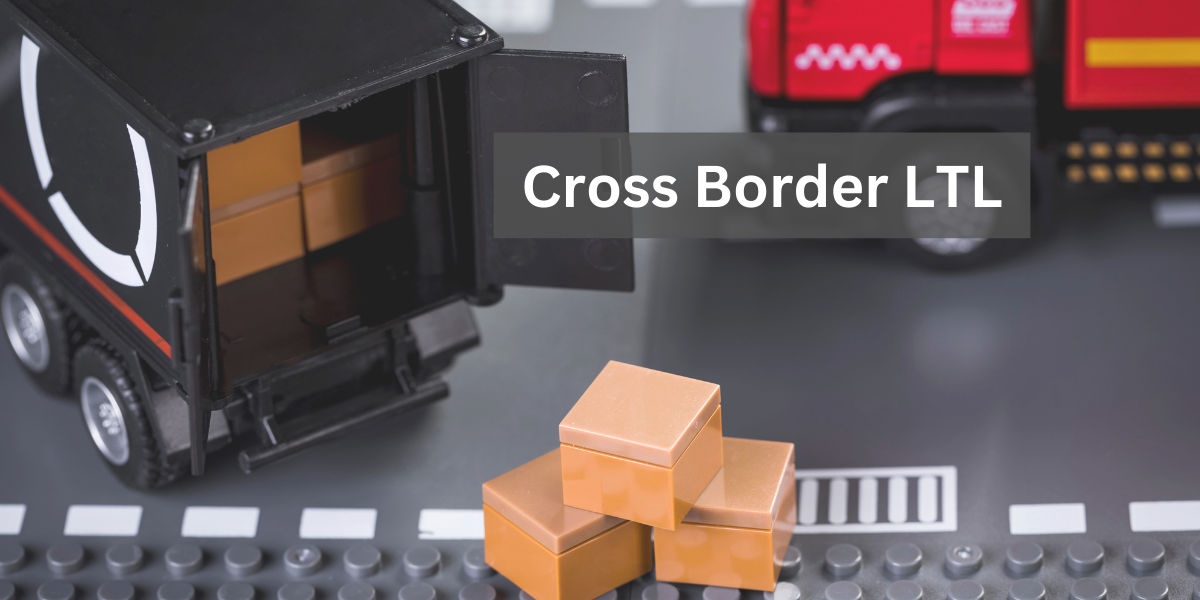Cross-border Less-Than-Truckload (LTL)
June 11, 2024

Cross-border Less-Than-Truckload (LTL)
As businesses expand internationally, streamlining operations and reducing costs are top priorities. Logistics, especially cross-border shipping, plays a critical role. Enter Less-than-Truckload (LTL) shipping, a cost-effective solution for smaller freight shipments. LTL offers flexibility and environmental benefits, making it ideal for small and medium-sized enterprises (SMEs) looking to grow overseas. This blog dives into the world of cross-border LTL shipping, exploring its importance, challenges, and future trends.
What is Cross-border LTL Shipping?
Cross-border LTL shipping refers to the transportation of goods that do not require the full space of a truck and are transported alongside other shipments. This method is highly efficient for businesses that need to ship small to medium-sized freight volumes across international borders. Unlike Full Truckload (FTL) shipping, where a single shipper's goods occupy the entire truck, LTL allows multiple shippers to share space and costs, making it an attractive option for managing international logistics economically.
Importance of Cross-border LTL Shipping
Economic Efficiency
For SMEs, in particular, the cost-effectiveness of LTL shipping is a significant advantage. By only paying for the space their cargo occupies, businesses can substantially reduce shipping costs. This efficiency is critical in international trade, where every penny saved can significantly impact competitiveness and bottom-line performance.
Environmental Sustainability
Cross-border LTL shipping also aligns with the increasing emphasis on sustainability. By consolidating shipments, it optimizes truckload capacity, thereby reducing the number of trips required and, consequently, the carbon footprint associated with transportation. This aspect of LTL shipping is becoming ever more crucial as businesses and governments alike strive for greener supply chain solutions.
Enhanced Flexibility and Reach
LTL shipping offers unparalleled flexibility, allowing businesses to respond swiftly to market demands and fluctuations. This flexibility is particularly beneficial for SMEs looking to expand into new markets without the need for substantial upfront investment in logistics and distribution.
Challenges in Cross-border LTL Shipping
Despite its advantages, cross-border LTL shipping is not without its challenges. Navigating the complex web of customs regulations, tariffs, and documentation requirements can be daunting, particularly for businesses venturing into international trade for the first time. Additionally, the logistics of coordinating multiple shipments from different shippers, each with their unique specifications and requirements, adds a layer of complexity to LTL shipping.
The Future of Cross-border LTL Shipping
The future of cross-border LTL shipping looks promising, driven by technological advancements and evolving trade policies. Innovation in logistics technology, including the use of blockchain for secure and transparent transaction records, AI for optimizing shipping routes and loads, and IoT devices for real-time tracking, is set to revolutionize the LTL shipping landscape. Moreover, trade agreements and policy reforms aimed at facilitating smoother international trade are likely to further enhance the appeal of cross-border LTL shipping.
Need to move smaller cargo internationally without paying for a full truckload? LTL (Less-Than-Truckload) shipping is a cost-effective solution for businesses of all sizes. VPlus Expert helps you navigate the complexities of international trade with our door-to-door trucking services across Southeast Asia. We handle everything from Thailand to Vietnam, Singapore, and more, making imports and exports a breeze. Plus, we simplify customs clearance for a smooth and sustainable shipping experience.
สารบัญเนื้อหา
บทความอื่นๆที่ใกล้เคียง
แสดงทั้งหมด
Cross-border Less-Than-Truckload (LTL)
June 11, 2024
สารบัญเนื้อหา
Cross-border Less-Than-Truckload (LTL)
As businesses expand internationally, streamlining operations and reducing costs are top priorities. Logistics, especially cross-border shipping, plays a critical role. Enter Less-than-Truckload (LTL) shipping, a cost-effective solution for smaller freight shipments. LTL offers flexibility and environmental benefits, making it ideal for small and medium-sized enterprises (SMEs) looking to grow overseas. This blog dives into the world of cross-border LTL shipping, exploring its importance, challenges, and future trends.
What is Cross-border LTL Shipping?
Cross-border LTL shipping refers to the transportation of goods that do not require the full space of a truck and are transported alongside other shipments. This method is highly efficient for businesses that need to ship small to medium-sized freight volumes across international borders. Unlike Full Truckload (FTL) shipping, where a single shipper's goods occupy the entire truck, LTL allows multiple shippers to share space and costs, making it an attractive option for managing international logistics economically.
Importance of Cross-border LTL Shipping
Economic Efficiency
For SMEs, in particular, the cost-effectiveness of LTL shipping is a significant advantage. By only paying for the space their cargo occupies, businesses can substantially reduce shipping costs. This efficiency is critical in international trade, where every penny saved can significantly impact competitiveness and bottom-line performance.
Environmental Sustainability
Cross-border LTL shipping also aligns with the increasing emphasis on sustainability. By consolidating shipments, it optimizes truckload capacity, thereby reducing the number of trips required and, consequently, the carbon footprint associated with transportation. This aspect of LTL shipping is becoming ever more crucial as businesses and governments alike strive for greener supply chain solutions.
Enhanced Flexibility and Reach
LTL shipping offers unparalleled flexibility, allowing businesses to respond swiftly to market demands and fluctuations. This flexibility is particularly beneficial for SMEs looking to expand into new markets without the need for substantial upfront investment in logistics and distribution.
Challenges in Cross-border LTL Shipping
Despite its advantages, cross-border LTL shipping is not without its challenges. Navigating the complex web of customs regulations, tariffs, and documentation requirements can be daunting, particularly for businesses venturing into international trade for the first time. Additionally, the logistics of coordinating multiple shipments from different shippers, each with their unique specifications and requirements, adds a layer of complexity to LTL shipping.
The Future of Cross-border LTL Shipping
The future of cross-border LTL shipping looks promising, driven by technological advancements and evolving trade policies. Innovation in logistics technology, including the use of blockchain for secure and transparent transaction records, AI for optimizing shipping routes and loads, and IoT devices for real-time tracking, is set to revolutionize the LTL shipping landscape. Moreover, trade agreements and policy reforms aimed at facilitating smoother international trade are likely to further enhance the appeal of cross-border LTL shipping.
Need to move smaller cargo internationally without paying for a full truckload? LTL (Less-Than-Truckload) shipping is a cost-effective solution for businesses of all sizes. VPlus Expert helps you navigate the complexities of international trade with our door-to-door trucking services across Southeast Asia. We handle everything from Thailand to Vietnam, Singapore, and more, making imports and exports a breeze. Plus, we simplify customs clearance for a smooth and sustainable shipping experience.

